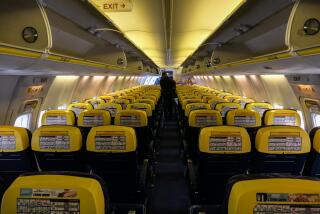Laptop Users Lap Up Flexibility
- Share via
There was a time in the not-so-distant past when the most important announcement an airline captain could make for the frequent business flier was that beverage service was about to begin.
Today’s business travelers could care less about double martinis with a twist. They want to know when they can flick the latch on the tray table in front of them. Once they get the OK, down come the trays, out pop the laptops, and the aircraft is instantly transformed into an airborne office.
There was also a time when leaving the job meant leaving the job. Sure, you could take work home, but there were limits. Now, with computers and modems, it’s easy to stretch the workday into the night.
Personal and portable computers, and their modem hookups, clearly have changed the way Americans travel and spend their leisure time. And many business people have no regrets about the way the new computer culture has changed their daily rhythm, at least according to a very random survey of computer users.
A laptop “gives me the freedom to do what I need to do,” says Bill Priebe, an environmental engineer from Midland, Texas, who was spotted on a recent weekday huddled over his Apple PowerBook while awaiting a flight out of Los Angeles International Airport. Priebe frequently scouts airports for electrical outlets to recharge his computer’s batteries, lest he find himself powerless mid-flight.
There are, of course, some frequent travelers who refuse to bring their work along for the ride. “The only thing that makes airline travel tolerable is to curl up with a book,” says Larry Gluck, a technology consultant from Thousand Oaks who is on the road two or three times a month.
“You will see people who are transferring airplanes and have an hour-and-a-half layover in the bar, having a drink, watching wrestling,” Gluck says. “As soon as they get on the plane, they pull out the computer. I’m just the opposite. I’ll work on the ground. When I get on the plane it’s just me and my book.”
It comes down to those who do and those who don’t. Many of today’s laptop users are the same folks who have always used flying time for business.
“I have always worked on the plane,” says Regina Shanney-Saborsky, a partner with the law firm Mitchell, Silberberg & Knupp in West Los Angeles. “I used to do everything in longhand, then gave it to my secretary to type. Now I input everything myself, I edit it myself and I have the secretaries pretty it up.
“If I’m being driven someplace, I take the PowerBook with me and work in the car,” she says. “If I need to draft a document, it’s far more peaceful to do it on a plane. There’s no phone. I spend three-quarters of my day on the phone.”
Peace aside, laptop computers are an expensive proposition. The low-end models will set the buyer back about $800 through mail-order catalogs. Those with lots of bells and whistles, such as a top-of-the-line IBM, can cost as much as $8,000.
There are at least half a dozen manufacturers of laptops, including Toshiba, Compaq, Acer, IBM, Dell and Apple.
“Professionals on the go are turning more and more to [laptops] for their portability,” says John Chun, sales manager of Personal Support Computers in West Los Angeles, which sells 50 to 60 portables a month. “You can pretty much work wherever you are. There are people who keep it near their bed so if they get an idea in the middle of the night, they can just turn it on and use it.
“It’s more convenient than a desktop because you don’t have to get out of bed, walk to your computer and turn it on,” Chun says. “You’re eliminating one step.”
For traditionalists who might point out that a piece of paper and a pencil eliminate another step, forget it. These computer advocates are committed.
Angela Stevenson of Ellington, Conn., was spending so much time surfing the Internet that she recently gave up her day job to form a business that enables people to play trivia games on the Prodigy online service. In her previous incarnation as an insurance company executive, Stevenson traveled all over the country with her PowerBook.
At a conference in South Carolina, Stevenson signed on to Prodigy from her hotel room. “I thought I was on a local line, but it turned out that the lines were owned by a private company,” Stevenson recalls. “When I went to check out, they handed me the phone bill. It came to $290. I never dreamed it would cost that much. I must have looked completely pathetic because they did take off the charge.”
It would be unfair to suggest that all laptop computer users are maniacal about spending time on their high-tech devices. Andrea Howard, a freshman at USC, found a novel idea for her PowerBook while waiting for a recent flight home to San Francisco.
With the usual airport hubbub swirling around her, Howard sat peacefully, her PowerBook planted firmly on her lap. But the computer was still in its case. Howard was using her laptop to prop up a book.
More to Read
Sign up for The Wild
We’ll help you find the best places to hike, bike and run, as well as the perfect silent spots for meditation and yoga.
You may occasionally receive promotional content from the Los Angeles Times.






